General Election 2019: The Facebook influencers you've never heard of
- Published
Far from newspaper offices and TV studios, committed volunteer activists have created an alternative Facebook media universe that could play a key role in the election campaign.
They have very different views on issues and politicians. They also don't necessarily have links to the main parties or mainstream campaign groups, and to some degree they all distrust the mainstream media.
But working from living rooms and bathtubs up and down the UK, they run Facebook pages that attract millions of likes, comments and shares.
BBC Trending has spoken to some of them.
The Rural Remainer
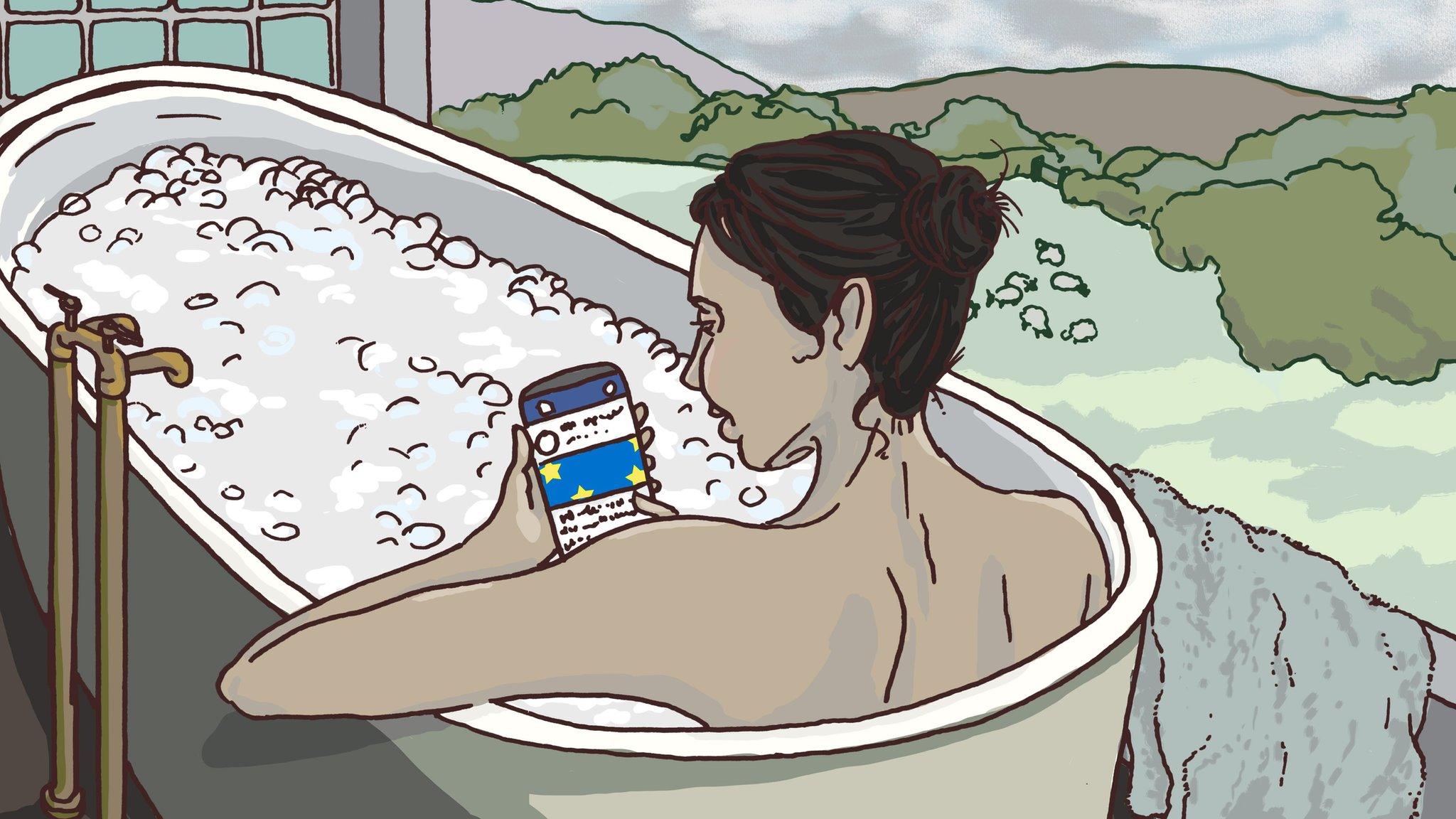
From a hamlet in Herefordshire, Laura Hartman runs a Facebook page called Stop Brexit Ltd. It's racked up more than half a million likes, comments and shares already this year with a mix of pro-EU memes and links to news articles.
"Nobody trusts the mainstream media," she says - although she does sometimes post links from big news outlets. She says listening to BBC Radio 4 makes her want to throw the radio "out of the window" - she thinks reporting is skewed in favour of Brexit.
"Our page is there for people who feel the same way," she says.
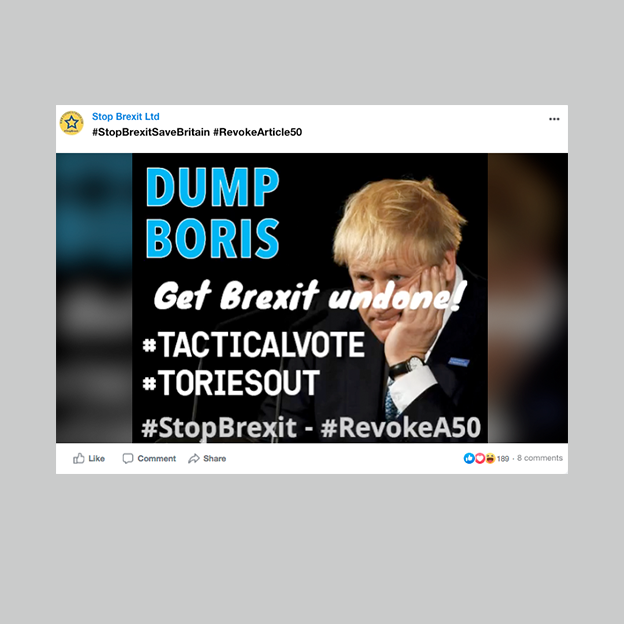
Ms Hartman used to live in London but moved to the countryside two years ago. She says online trolls accuse her of being part of the "metropolitan elite".
"Do I sound like the elite? No. I'm living in deepest 'Leaverville' now," she says. "Don't accuse me of latte-sipping and avocado-eating on the South Bank."
'It's relentless'
When Ms Hartman tells us how the pro-EU Facebook ecosystem works, it sounds as if she could be talking about a military command structure.
She's part of a local Facebook group called Herefordshire for EU, which interacts with a larger group called West Midlands 4 Europe, and smaller local groups like Ledbury for Europe (Ledbury is a small Herefordshire town). All the groups post and repost memes and links throughout the day.
Their Facebook groups are all discussion areas where anyone can create posts. By contrast, posts on pages like Stop Brexit Ltd can only be created by administrators, although users can still comment on them.
Ms Hartman says she uses apps like Slack and Telegram to speak to other activists. "It's absolutely relentless," she says.
The pro-EU Facebook world includes several bigger anti-Brexit pages - some of which have big budgets and highly-trained staff.
8.5 millionBest for Britain
8.3 million Scientists for EU
6 millionBritain for all
But there's still room for pages run from bathtubs - or from shopping centres in Leeds.
Independent of Ms Hartman's network, 61-year-old retired teacher Brendan McGrath set up a Facebook page called Brexit Crap.
He often updates it while out buying clothes with his teenage daughter. It has collected almost 250,000 likes, shares and comments this year.
He says he runs the page to "redress the balance" of newspapers he views as "heavily biased" in favour of Brexit.
'I hate Facebook'
In the Remainer network, the themes are always the same: Brexit negotiations are going badly, Boris Johnson is untrustworthy, and foreign interference in elections is not getting the coverage it deserves.
Recent research by media regulator Ofcom says smartphones encourage "passive news consumption" with people prioritising "quantity over depth in their news intake".
Ms Hartman's page thrives off this trend, but at the same time, she thinks it's bad for society. "I'll leave Facebook when we stop Brexit," she says. "I absolutely hate it."

The Yorkshire Brexiteer
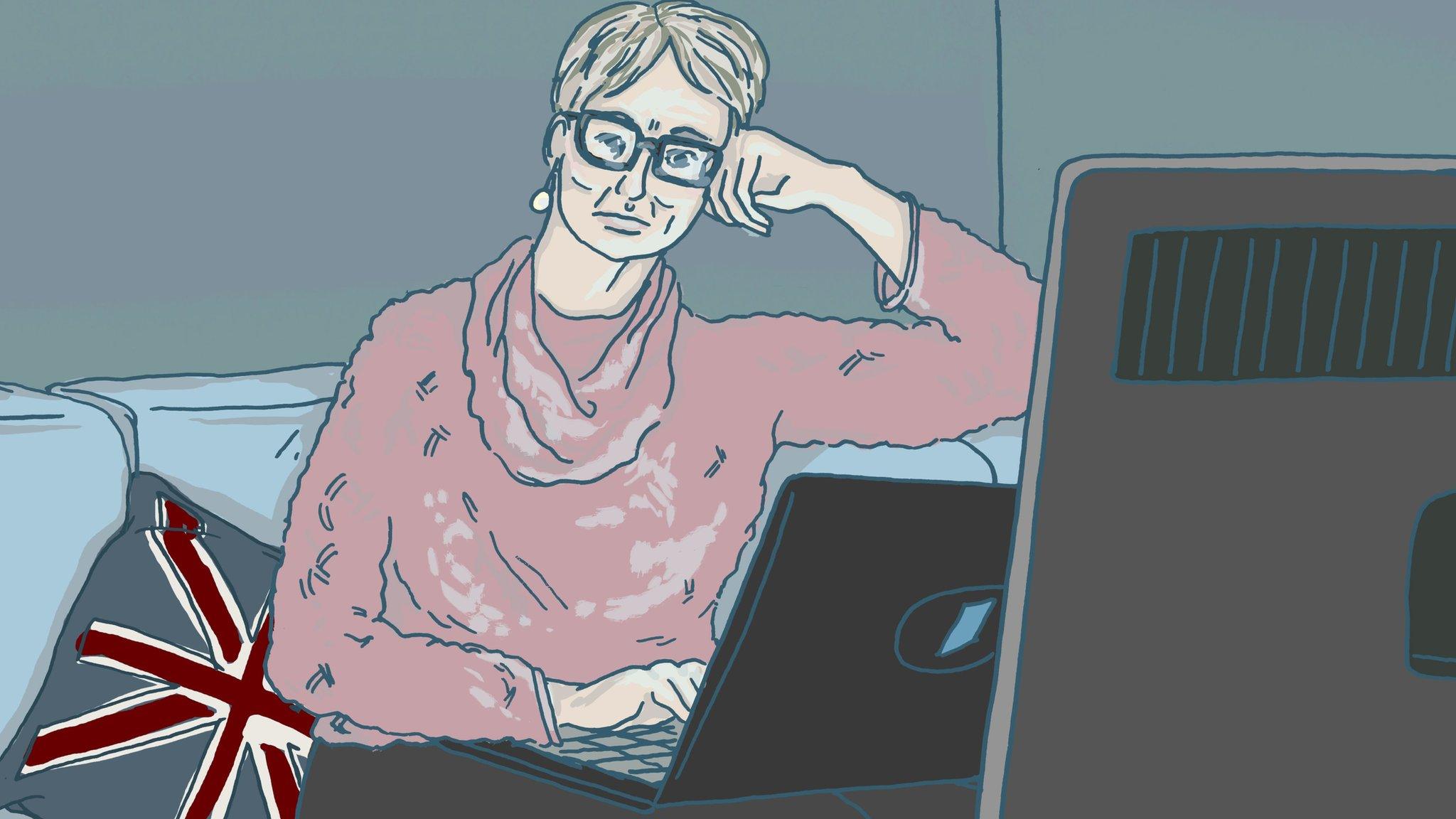
Ann is a big supporter of Brexit. She runs a page called We're More Than a Star on Someone Else's Flag, which she regularly updates while watching TV at home, in North Yorkshire.
A pinned post on the page urges readers to "vote and work for Conservative Candidates" because Mr Johnson "offers a pathway to a clean Brexit".
Ann - she won't tell us her surname - says the mainstream press fails to represent her and millions of Leave voters who live outside big city media bubbles.
She cites a recent national newspaper article, external about a town she knows well. "They were writing about the people of Darlington like they were an obscure tribe," she says.
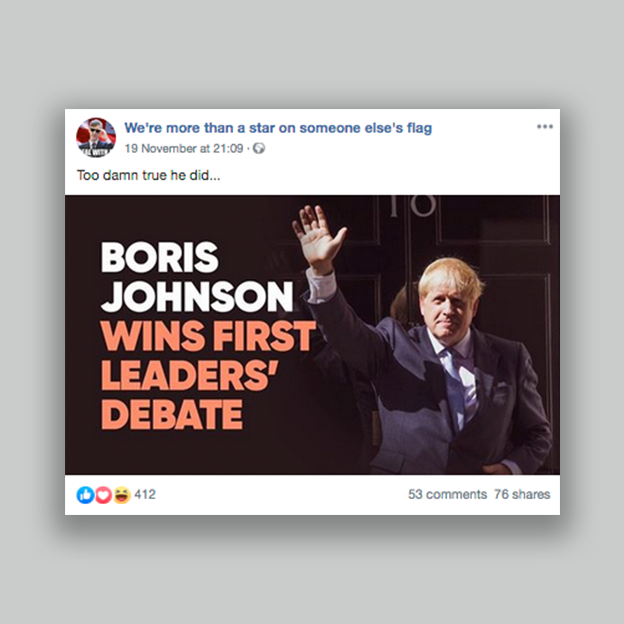
She's been an active Twitter user for seven years but turned her attention to Facebook following the 2016 referendum. "I was looking to reach ordinary patriotic working class voters so I targeted ads at football clubs and rugby league clubs," she says.
Nowadays she relies on "organic sharing" - encouraging users to share her posts with their own networks - rather than paid ads. The number of likes on the page isn't huge - just over 10,000 - but this does not tell the full story of its influence.
"Often [other pages] will copy and paste the memes and share them to other groups," she notes. It's a pattern repeated across social media - copying and pasting means the total number of shares and likes are only one part of the viral story.
Facebook is often criticised for its role in spreading misinformation and offensive content. Ann says she deletes racist or defamatory comments on her page but it's "a lot to get through".
She admits she was once caught out by fake news. Last year, a story went viral claiming Cambridge University students had "banned" Remembrance Day poppies. It wasn't true., external Ann deleted her post about the story when it was pointed out to her as a fake.
Despite much of the negative recent press surrounding Facebook, Ann is still a fan of the site. She thinks it enables people to express themselves in a way that wasn't possible a few years ago. "It's giving the voiceless a voice," she says. "It's a very democratic tool."
There is a huge appetite for pro-Brexit content on Facebook - as the biggest pages indicate.
28.4 million Leave.EU
8.5 millionGet Britain Out
5.7 millionFight4Brexit
But much of the energy has come from grassroots activists like Ann, or Mark Childs, who works as the managing director of a building company.
Mr Childs set up his pro-Brexit page, Brexit Peaceful but Loud and Proud, shortly after the 2016 referendum. "I think people prefer my page to the mainstream media because it has a more personal tone," he says. "People want honesty."
While Remainers say the BBC is unfairly biased against them, Mr Childs says the opposite. "BBC is completely biased to support the left and will always support the EU," he contends.

The Joker
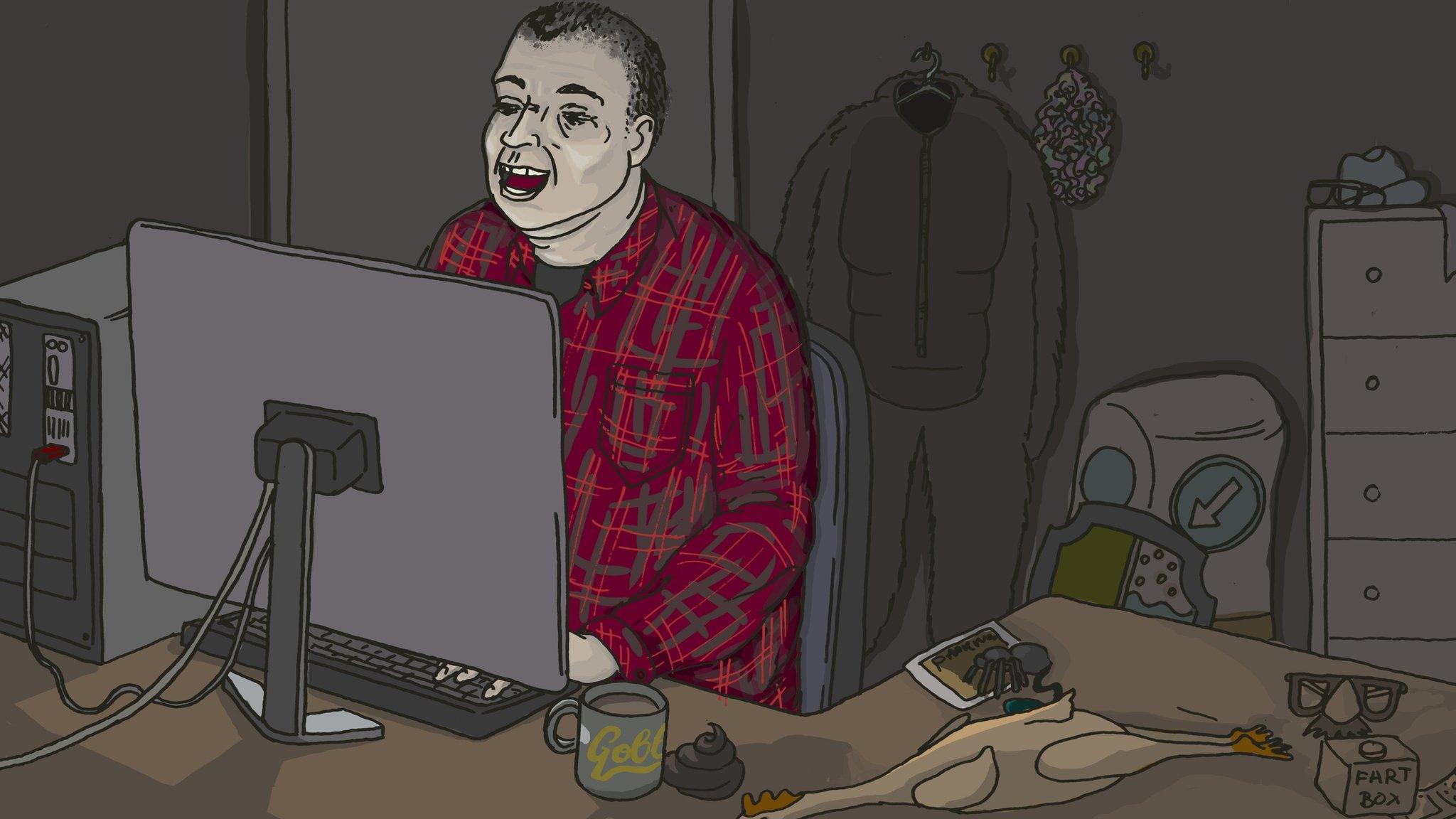
It's not just fiery partisans who get traffic from posting about politics. Some people start doing it as a joke.
A page called Gobby Geezer is run by Mike Haliday, 60, a former practical joker from Staffordshire. He mostly posts funny and nostalgic memes which have more than 100,000 combined likes, comments and shares since the start of 2019.
But as we get closer to polling day, more and more election-related posts lurk among the apolitical banter. "I put stuff on there about Corbyn and [Shadow Home Secretary Diane] Abbott, as it does well," Mr Haliday says.
He says his page has "no agenda" other than posting things, which his followers will find funny. But his sense of humour clearly appeals to people more inclined to be pro-Brexit and against the Labour Party.
So anti-Labour memes go down well, especially when there's an attempt at humour.
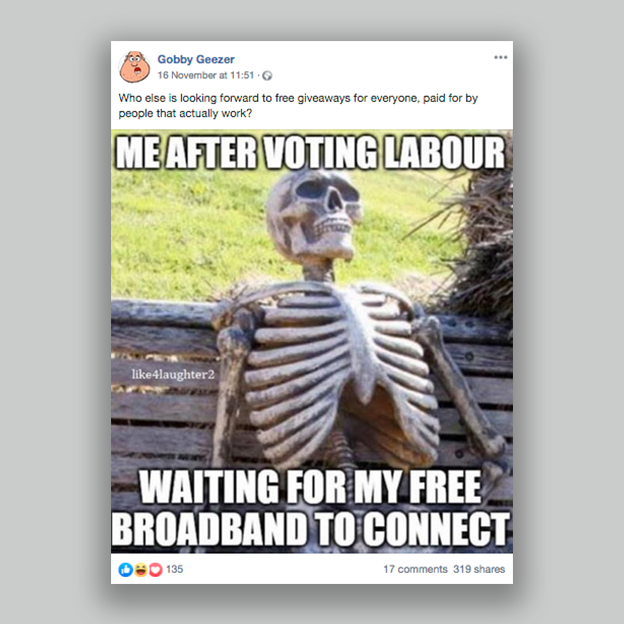
Mr Haliday says he sometimes bans "idiots" from his page but generally lets the arguments run.
"I find it quite funny how angry people get," he says. "I grab my bowl of popcorn and watch the comments. They get really wrapped up in it."

The Corbynistas
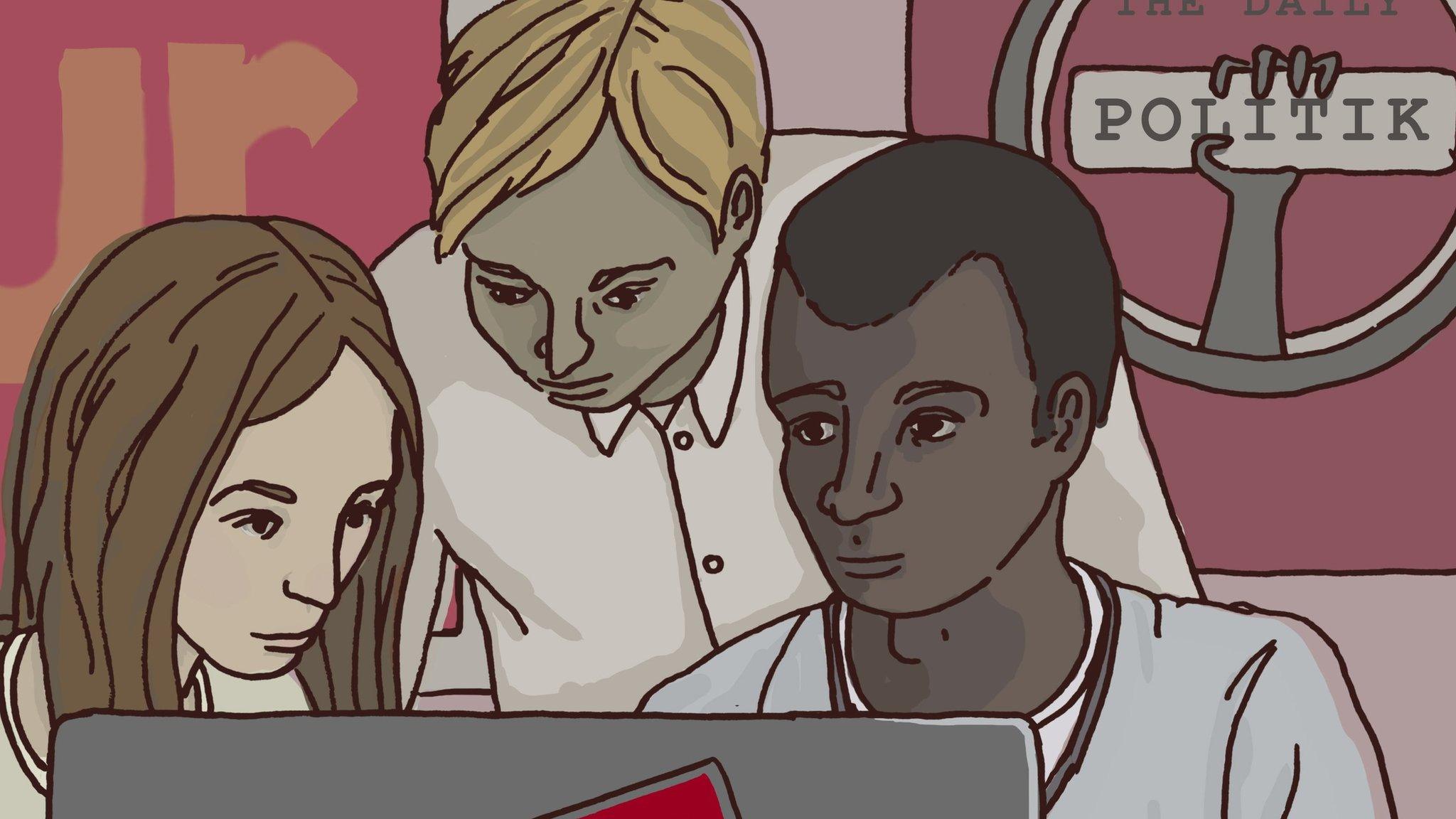
A number of left-wing, pro-Jeremy Corbyn pages have attracted huge levels of engagement, including the Daily Politik, which has around 120,000 likes.
The administrators of the page tell the BBC they're based in Yorkshire and London and are providing a "counter-narrative" to the "imbalance" of the press.
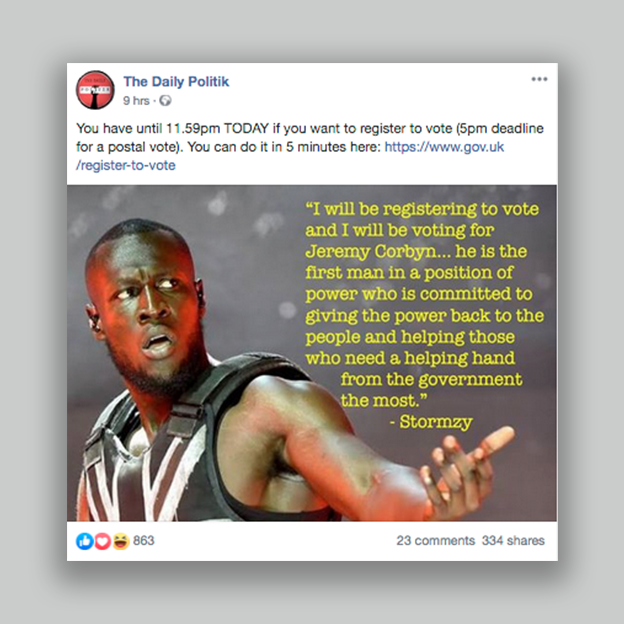
One of the big online stories during the 2017 general election was the influence of a host of similar pro-Corbyn pages.
But last year Facebook chief executive Mark Zuckerberg announced a major change to the site: prioritising posts from friends and family over ones from businesses, brands and media. This changed the landscape overnight, with many pages struggling to retain traffic.
The admin of a smaller left-wing Facebook page, The Ragged Trousered Philanderer, says that the change had a big impact.
"Facebook is not as effective any more but it's still the best method of reaching people," says the man, who asked to be identified as JJ.
You won't find political balance or carefully reasoned argument designed to persuade on any of these outlets. They're not trying to change people's minds, but rather to rally the troops, spread lines of attack and get people to pitch in - online, or maybe even offline.
Social media has empowered people - from Herefordshire hamlets to Yorkshire living rooms - to set up their own political news outlets. Many people feel these pages represent them more than a newsroom in a city miles away.
But on social media there is also a higher chance of misinformation or misleading stories spreading quickly.
And Facebook pages, it has been suggested, can create "filter bubbles" - places that conform to one particular worldview.
The rise of this alternative media universe can make it harder to understand the other side of the argument - or remember that it exists at all.
Illustrations by Emma Russell, external
Have you spotted something interesting on social media? Is there something we should be investigating? Email us, external
Follow BBC Trending on Twitter @BBCtrending, external, and find us on Facebook, external. All our stories are at bbc.com/trending.